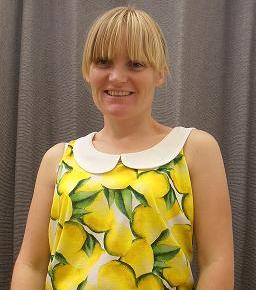
I was a fashion designer, but when I lost my central vision because of a genetic condition I had to stop doing that. It meant not having a very good colour perception which is important when choosing clothes for a collection.
I had to rethink a lot of practical things. I moved out of London to live with my parents because I needed some support and I didn’t have a job so could not pay the rent. Whilst living there, I decided that my main goal was to become employable. That included having to learn many things from scratch again. I needed to get my confidence back to use public transport and I had to learn how to use a computer again with a screenreader. I went to Queen Alexandra College in Birmingham for an assessment day and asked them to please let me on to the training course they were currently running so that I could start my new independent life as soon as possible. They accepted me and even kept the college open for two weeks during the summer holidays so I could complete it.
No, not at all. But that had a lot to do with the fact that I refused to think of myself as different to who I was before. I am Steph Cutler, I have a visual impairment, but that’s not a barrier to the things I want to do. Perception is so often based on how you present yourself to others. If you make sure you look and present yourself well, people will take you seriously. If you are negative it shows through your appearance and attitude, so you will not be perceived well. This is the same for non-disabled people, but I feel it is more important than ever for me now.
So that’s how my second business, which is now my primary one, was born. I am now an inspirational speaker, personal coach and trainer and I work with groups and individuals.
When you are self-employed you can easily work around your impairment. You can work at the times you want and adapt the work to be exactly how you need it to be. If anyone would like to start their own business I’d say never be afraid of failing. Being an entrepreneur is about having ideas. Some things will work, some things won’t – if you are new to it, it takes trying and sometimes failing to get everything right in the end. Make sure you do your research to be clear that there is a market for your idea and if you are satisfied that your idea is viable, then go for it!
It’s great not to have someone telling you what to do. On the other hand, it means you have to be very self-disciplined. Nobody tells you off if you choose to spend a day in bed, but that won’t pay your bills! Working for yourself is very exciting and opportunities find you – opportunities that you probably wouldn’t get if you were working for someone else.
It was, in a way, the only name it could have. Losing my sight and having to adapt was a lemon in a sense. However, I refused to let that stop me from living a full life, I used it to do something positive – I took my lemon and made lemonade. During the difficult times of learning to live with my newly acquired sight loss I would tell myself, “if life deals you lemons then make lemonade” and I now help others to make their lemonade.
There are many lemonade stories. I have worked with many disabled people whose confidence has grown as they have identified that being disabled doesn’t mean that they can’t make a contribution. I have supported countless people to achieve their potential and exceed their own expectations.
I suggest you sit down and figure out your vision. The vision I am talking about has nothing to do with sight, it’s the vision for your life. Set yourself goals then go back and look at how to achieve them step by step. During this process do not consider any barriers that you believe exist. Set your goals as if you have a magic wand that eliminates barriers then figure out how to overcome the barriers. Where there is a will there is a way!
